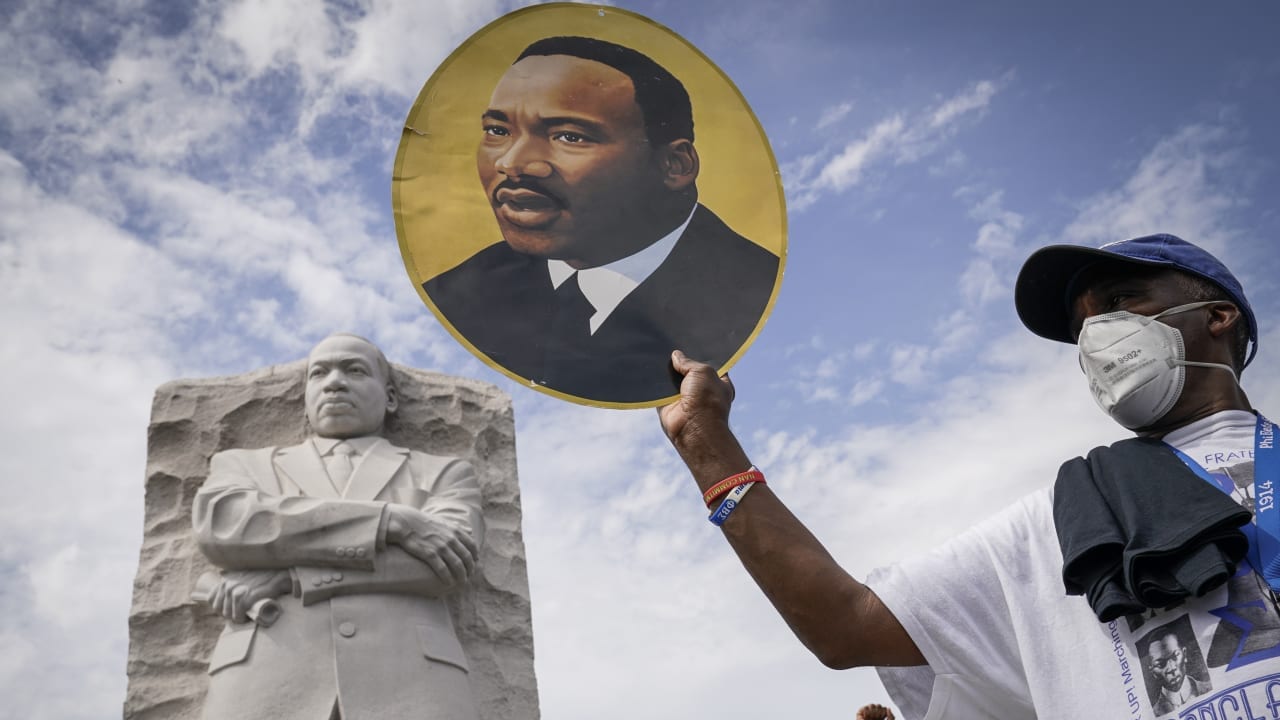This 4th of July, let’s reflect on the dangerous politics of revisionist history
OPINION: The conservative backlash to the gains of the Civil Rights Movement has taken the shape of a powerful political strategy: misrepresenting Martin Luther King Jr.'s words against the multicultural democracy he fought for and was killed for. The post This 4th of July, let’s reflect on the dangerous politics of revisionist history appeared first on TheGrio.

OPINION: The conservative backlash to the gains of the Civil Rights Movement has taken the shape of a powerful political strategy: misrepresenting Martin Luther King Jr.’s words against the multicultural democracy he fought for and was killed for.
Editor’s note: The following article is an op-ed, and the views expressed are the author’s own. Read more opinions on theGrio.
Amid the fireworks and backyard barbeques celebrating the birth of the United States, we ought to take a moment to reflect on the fire looming on the horizon that threatens the nation’s future. The recent slate of anti-democratic Supreme Court decisions is part of a long-building and more ominous phenomenon: the right-wing’s political strategy of distorting the past to control the future.
Many will look at the Supreme Court’s decisions as casualties of the contemporary culture wars. In doing so, we miss the longer political game that has been brewing for over four decades. This political game ensures we misunderstand the world around us by misunderstanding how we got here. The recent book bans and legislation against racial education are the most explicit of long-standing efforts that have built the culture of willful ignorance the late philosopher Charles W. Mills warned us about, under the guise of preserving “true” American identity. As Justice Ketanji Brown Jackson wrote in the dissent to the repeal of affirmative action, “… having so detached itself from the country’s actual past and present experiences, the Court has now been lured into interfering with the crucial work that institutions of higher learning are doing to solve America’s real-world problems … ultimately, ignoring race just makes it matter more.”
In a country where even poor white people in the bottom 20% of the income distribution have a higher median net worth than all Black people, how can the highest court in the land take seriously the notion that race-conscious legislation hurts the dominant group? Worse yet, how can right-wing politicians so egregiously use Dr. Martin Luther King Jr.’s words to legitimize the case, as Sarah Huckabee Sanders did when she tweeted, “As Martin Luther King Jr said, people should be judged on the content of their character, not the color of their skin. The Supreme Court affirmed that fundamental truth in today’s decision.”
My six years of research on the political misuses of Dr. King’s memory in the book, “The Struggle for the People’s King: How Politics Transforms the Memory of the Civil Rights Movement” finds that the conservative backlash to the gains of the Civil Rights Movement — across sectors including education, housing, voting, and employment — has taken the shape of a powerful political strategy: misrepresenting Dr. King’s memory as a Trojan horse for anti-civil rights causes. From civil rights rollbacks during the Reagan administration to right-wing legislative attacks on LGBTQ rights through the 2000s to the rise of the Tea Party to foretell the MAGA era, each of these moments weaponized King’s words against the multicultural democracy he fought for and was killed for. An NPR report in 2021 showed that at a press conference about the threat of critical race theory, half the Republican speakers used King’s words about his dream of a world where we are judged by the content of our character and not the color of our skin to justify the restriction of education in our nation’s racial history.
In this political game, distorting the past is the point. Distorting the past is the strategy. If we are presented with a collective memory of the Civil Rights Movement as a final chapter in America’s story of racism, then it is unclear why race-conscious policies or student loan forgiveness are necessary. If we are presented with a revisionist collective memory of Dr. King as a model of American meritocracy and individualism, arguing for a colorblind nation, then race-conscious policies seem antithetical to King’s dream.
Certainly, there are those who believe that if we stop talking about race, our social problems will dissipate, that Dr. King believed recognizing race is its own form of racism (despite a historical record that clearly shows otherwise). However, if we put our blinders on and act — legally, politically, and culturally — as if race does not matter, then we paradoxically strengthen and aggravate the system of racial inequality. More dangerously, we lose sight of the political game that weaponizes Dr. King and the past to distort social reality, pit us against one another, and dismantle multicultural democracy.
In 1963, Dr. King said, “There is nothing in all the world more dangerous than sincere ignorance and conscientious stupidity.” How can we resist a politics that seeks to make willful ignorance the law of the land, that distorts the way we understand who we were so we can understand who we are and where we are going? We can begin by restoring and fiercely protecting a robust critical education in our schools and communities, holding our political, media and educational institutions accountable for legitimizing and spreading the political misuses of memory, and supporting the work of Black community organizations that carry the grounded knowledge of our collective truth. This July 4th, let’s remember our societal future hangs in the balance.

Hajar Yazdiha is an Assistant Professor of Sociology, University of Southern California Dornsife College of Letters, Arts, and Sciences and faculty affiliate of the Equity Research Institute. Her research examines the mechanisms underlying the politics of inclusion and exclusion as they shape intergroup boundaries, ethno-racial identities, and intergroup relations.
TheGrio is FREE on your TV via Apple TV, Amazon Fire, Roku, and Android TV. Please download theGrio mobile apps today!
The post This 4th of July, let’s reflect on the dangerous politics of revisionist history appeared first on TheGrio.












